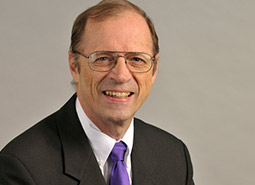Chemist Awarded Zewail Prize in Molecular Sciences
Professor George Schatz is recognized for his work in gas-phase reaction dynamics, plasmonics and nanostructured materials
By Rebecca Lindell
 Nanoscientist George Schatz has been awarded the Ahmed Zewail Prize in Molecular Sciences by the journal Chemical Physics Letters.
Nanoscientist George Schatz has been awarded the Ahmed Zewail Prize in Molecular Sciences by the journal Chemical Physics Letters.
Schatz, the Charles E. and Emma H. Morrison Professor of Chemistry in the Weinberg College Department of Chemistry, is being recognized for his outstanding contributions to the theory and understanding of gas-phase reaction dynamics, plasmonics, and nanostructured materials. The prize, which is awarded on a biennial basis, was developed by Elsevier to honor Nobel Laureate Professor Ahmed Zewail, a longtime editor of Chemical Physics Letters.
Schatz is a theoretician who studies the optical, structural and thermal properties of nanomaterials, including plasmonic nanoparticles, plasmonic metamaterials, DNA and peptide nanostructures, and carbon-based materials. He has contributed to theories of dynamical processes, including gas phase and gas/surface reactions, energy transfer processes, transport phenomena and photochemistry.
In addition to his appointment in the College’s Department of Chemistry, Schatz holds a courtesy appointment in the McCormick School of Engineering’s Department of Chemical and Biological Engineering and is associated with the Applied Physics Program. He received his undergraduate degree in chemistry from Clarkson University and earned his PhD at the California Institute of Technology. He completed his postdoctoral work at the Massachusetts Institute of Technology and has been a member of the Northwestern University faculty since 1976.
Schatz, who has published three books and over 900 papers, is a member of the National Academy of Sciences, the American Academy of Arts and Sciences and the International Academy of Quantum Molecular Sciences. He has served as editor-in-chief of the Journal of Physical Chemistry since 2005 and has received numerous awards, including the Max Planck Research Award, the Bourke Medal of the Royal Society of Chemistry, the Feynman Prize of the Foresight Institute, the Herschbach Medal, the Debye Award of the ACS, the S F Boys-A Rahman Award of the Royal Society of Chemistry, and the Langmuir Award of the ACS.
He is a Fellow of the American Physical Society, the Royal Society of Chemistry, the American Chemical Society, and the American Academy of Arts and Sciences.
Back to top